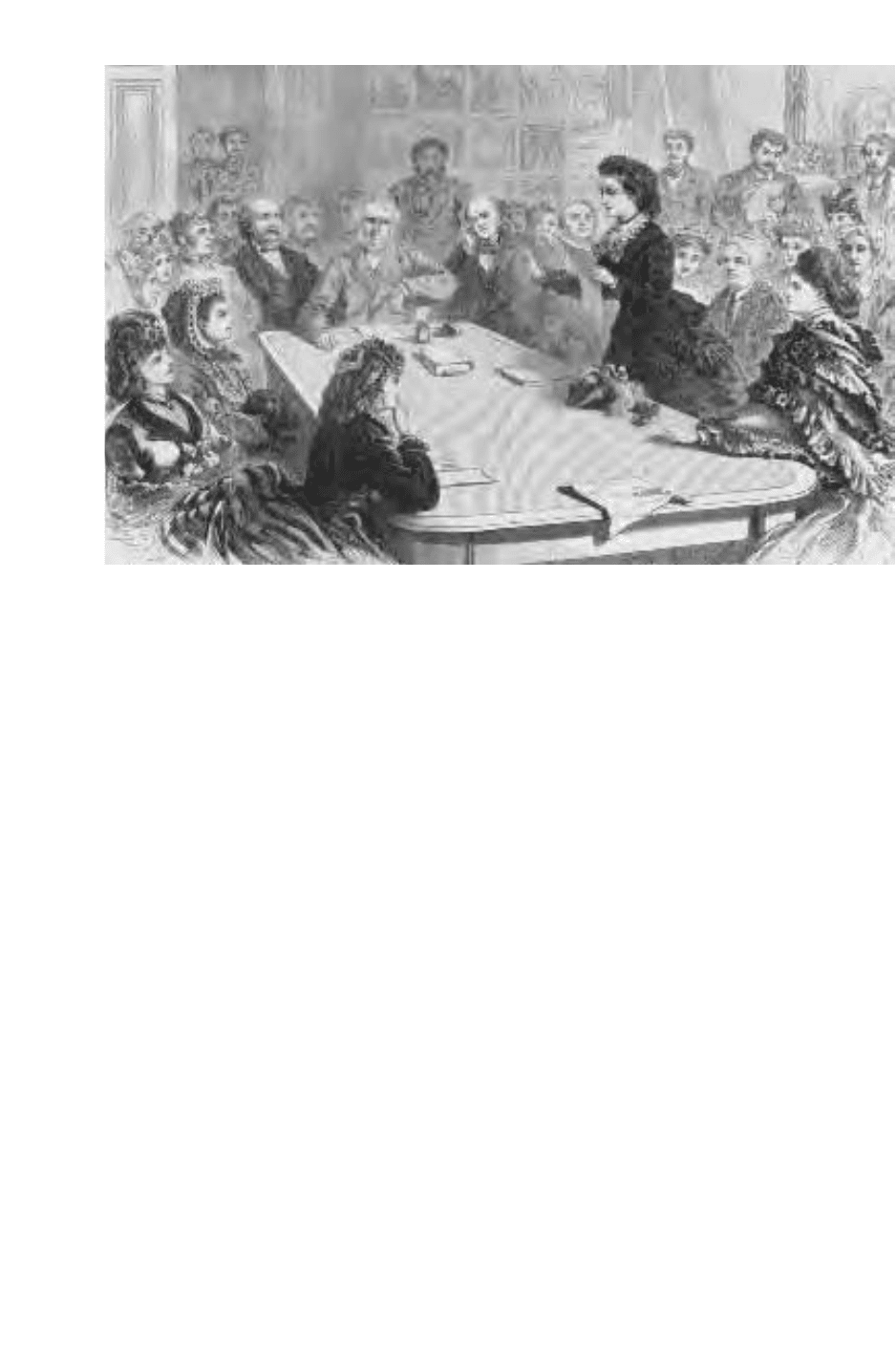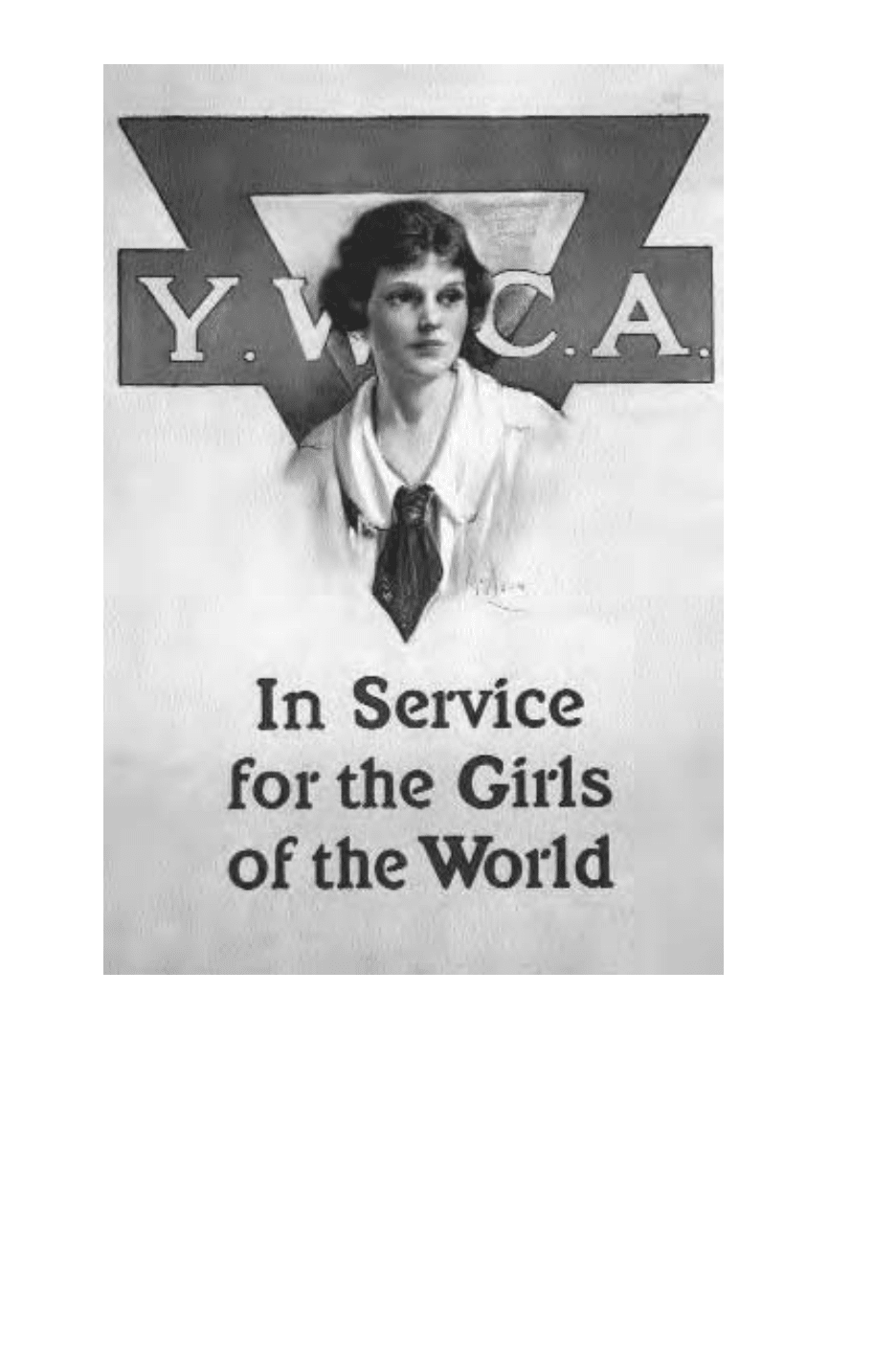Schenken Suzanne O’Dea. From Suffrage to the Senate: An Encyclopedia of American Women in Politics (2 Volumes)
Подождите немного. Документ загружается.


working hours, and unhealthy working conditions and helped pass pro-
tective legislation. The WTUL held its last national convention in 1947.
During the post–World War II years, WTUL’s financial support dimin-
ished, its leadership aged, and many people feared being associated with
unions because they were under attack for alleged connections with com-
munism. WTUL dissolved in 1950.
See also Protective Legislation
References Orleck, Common Sense and a Little Fire (1995).
Woodhouse, Chase Going (1890–1984)
Democrat Chase Going Woodhouse of Connecticut served in the U.S.
House of Representatives from 3 January 1945 to 3 January 1947 and from
3 January 1949 to 3 January 1951. As secretary of the Democratic Caucus
in the 81st Congress (1949–1951), Woodhouse was the first woman to
hold a leadership position in Congress. Her term in Congress overlapped
that of one of her former students, Jessie Sumner.
A social worker for a brief time, Woodhouse studied economics in
Germany and England. She then became a fellow in political economy at
the University of Chicago. Between 1918 and 1946, she held teaching and
administrative posts. Woodhouse was also involved in women’s groups,
serving as president of the Connecticut League of Women Voters, Con-
necticut Federation of Democratic Women’s Clubs, and Altrusa Clubs.
Connecticut secretary of state from 1941 to 1942, she instituted election
law schools in the interest of public information.
In her campaign for Congress, Woodhouse emphasized establishing
a world peace organization, maintaining full employment during peace-
time, revising the tax system, providing adequate educational facilities,
and expanding rural electrification. She worked for congressional ap-
proval of the International Monetary Fund and for the International Bank
for Reconstruction and Development and has been given credit for the in-
corporation of these two groups into the United Nations. She fought to
maintain wartime price controls to protect consumers and for additional
affordable housing for veterans.
After losing her reelection attempt in 1946, Woodhouse was execu-
tive director of the women’s bureau of the Democratic National Commit-
tee from 1947 to 1948. She regained her congressional seat in 1948 but lost
again in 1950. Woodhouse was assistant to the director of Price Stabiliza-
tion from 1951 to 1953.
Born in Victoria, British Columbia, Chase Going Woodhouse gradu-
ated in 1912 and received her master of arts degree in 1913, both from
McGill University in Montreal, Canada.
Woodhouse, Chase Going 719

See also Congress, Women in
References Center for the American Woman and Politics, Eagleton Institute of
Politics, Rutgers University; Engelbarts, Women in the United States Congress,
1917–1972 (1974); H. W. Wilson, Current Biography: Who’s News and Why,
1945 (1945); Office of the Historian, U.S. House of Representatives, Women in
Congress, 1917–1990 (1991).
Woodhull, Victoria Claflin (1838–1927)
The first woman to run for president of the United States, Victoria Wood-
hull was a candidate for the office in 1872 and in 1892. A protégée of Cor-
nelius Vanderbilt, Woodhull was also the first woman stockbroker in the
United States. Her reform activities and her advocacy for free love created
controversies and turmoil within the suffrage movement for more than a
decade. To Woodhull, free love meant that women had absolute control
over their own sexual and reproductive lives.
Born in Homer, Ohio, Victoria Woodhull received little education.
She married when she was fifteen years old and divorced about eleven
years later. In 1868, Woodhull and her sister Tennessee Claflin moved to
New York City and arranged to meet Cornelius Vanderbilt, reputedly the
wealthiest man in the United States. Under his tutelage, the two sisters
made a fortune in the gold market in 1869. Vanderbilt sponsored their
Wall Street brokerage firm, Woodhull, Claflin, and Company, making
Woodhull the country’s first woman stockbroker. From 1870 to 1876, the
sisters published Woodhull and Claflin’s Weekly, a financial and reform
newspaper that reported on Wall Street fraud, free love, and legalized
prostitution in addition to Woodhull’s political views.
Woodhull had attended her first women’s rights convention in 1869
and heard Susan B. Anthony and Elizabeth Cady Stanton speak on woman
suffrage and related topics. In Woodhull and Claflin’s Weekly, Woodhull
advocated education for girls, declared that her experience demonstrated
that women could work in many professions, and argued that women
should be paid as well as men. A few weeks before Woodhull and Claflin’s
Weekly had begun publication, Woodhull had announced her candidacy
for president of the United States in the 1872 elections and promoted it
through the newspaper.
Woodhull also became involved in Washington politics in 1870, es-
tablishing herself as a lobbyist for woman suffrage. In Woodhull and
Claflin’s Weekly, she wrote that a suffrage amendment was unnecessary if
the Constitution were properly interpreted. She argued that women were
citizens in the same way that men were and that women paid taxes, as did
men. She shared Virginia Minor’s belief that the Fourteenth Amendment
established women’s right to vote, adding that the Fourteenth and Fif-
720 Woodhull, Victoria Claflin

teenth Amendments nullified state legislation that prohibited women
from voting. She concluded that enabling legislation to clarify the point
was all that was necessary and lobbied Congress for it as well as meeting
with President U.S. Grant to get his support for her interpretation, but he
did not provide the endorsement she wanted. She presented a memorial
to the House Judiciary Committee asking for the enabling legislation, but
it considered and rejected the idea.
Woodhull’s presidential candidacy gained the support of Elizabeth
Cady Stanton and Susan B. Anthony in 1871. When the 1872 National
Woman Suffrage Association (NWSA) convention met, Woodhull at-
tempted to take the leadership away from Stanton and Anthony, but An-
thony prevailed in a tumultuous meeting. Woodhull left the NWSA con-
vention, called her own convention, and formed the Equal Rights Party.
The party named Woodhull its presidential nominee and Frederick Doug-
lass its vice presidential nominee. Douglass, however, declined. Shortly af-
ter the convention, Woodhull’s brokerage failed, and she lost her housing
and offices.
Scandal erupted shortly before the November 1872 election. After di-
vorcing her first husband in 1865, Woodhull had married Colonel James
Harvey Blood in 1868, although no record of the marriage has been
found. In 1871, Woodhull’s aging and ill first husband had moved in with
Woodhull and her second husband, Blood. The revelation of their un-
common arrangement became a scandal. Woodhull responded with a
Woodhull, Victoria Claflin 721
Victoria Woodhull
was the first woman
to run for president
of the United States
in 1892; this woodcut
shows her testifying
to the House
Judiciary Committee
regarding woman
suffrage, 1871 (Frank
Leslie’s Illustrated
Newspaper)

newspaper article and expounded on her belief in free love “as the only
cure for immorality.” To justify her lifestyle, Woodhull revealed in the 2
November 1872 edition of Woodhull and Claflin’s Weekly that powerful
Brooklyn preacher Henry Ward Beecher was having an affair with Eliza-
beth Tilton, a parishioner, who was Theodore Tilton’s wife. Beecher had
been a mentor to and trusted friend of Theodore Tilton. Woodhull and
Claflin were arrested and jailed for publishing the Tilton-Beecher scandal,
which authorities deemed obscene. They were both later acquitted, but
the scandal effectively ended Woodhull’s political career.
The scandal also created a breach within the woman suffrage move-
ment. Anthony and Stanton defended Woodhull, but their defense did lit-
tle to help Woodhull and generated public criticism of Anthony and Stan-
ton. Woodhull’s advocacy of free love was used to attack and discredit
woman suffrage and women’s rights supporters.
In 1876, Woodhull ended publication of Woodhull and Claflin’s
Weekly, and the next year she moved to England, where she lectured. She
returned to the United States for a second presidential campaign in 1892.
See also Anthony, Susan Brownell; National Woman Suffrage Association;
Stanton, Elizabeth Cady; Suffrage
References Underhill, The Woman Who Ran for President: The Many Lives of
Victoria Woodhull (1995).
Woolsey, Lynn (b. 1937)
On 3 January 1993, Democrat Lynn Woolsey of California entered the
U.S. House of Representatives, where her personal experiences have influ-
enced some aspects of her congressional actions. Divorced in the 1960s,
she had three children to support and few economic resources and spent
three years on welfare. In 1994, she told her congressional colleagues, “I
differ from every mother member of this House because I am the only
member of Congress to have been a welfare mother. So my opinions are
not based on theory. They are based on real-life experience.” The welfare
reform bill she introduced included a child support assurance program
and guaranteed child support from the federal government.
Believing that education makes a significant difference in people’s
ability to support themselves, she has made education a top priority. She
passed a bill to provide child care, health care, and crime prevention pro-
grams to schools. She supports an increase in the minimum wage; tax de-
ductions for college expenses; and expanded pension coverage, portabil-
ity, and protection.
She has staunchly supported environmental issues, including her
proposal for the Point Reyes National Seashore Farmland Protection Act
and her efforts to maintain the ban on offshore oil drilling. She has ob-
722 Woolsey, Lynn

tained federal funding to extend carpool lanes, construct park-and-ride
lots, and complete the purchase of the Northwest Pacific Railroad right-
of-way. Other policy priorities include gun control, the solvency of
Medicare, reproductive rights, and universal health care coverage.
Woolsey held the leadership position of House deputy minority whip in
the 106th Congress (1999–2001).
Born in Seattle, Washington, Woolsey attended the University of
Washington from 1955 to 1957 and received her bachelor of science de-
gree in human resources and organizational behavior from the University
of San Francisco in 1980. Woolsey started Woolsey Personnel Service, a
human resources consulting and employment agency, in 1980. She served
on the Petaluma City Council from 1985 to 1993.
See also Abortion; Child Support Enforcement; Congress, Women in
References Congressional Quarterly, Politics in America 1994 (1993);
www.house.gov/woolsey/bio.htm.
Wright, Frances (Fanny) (1795–1852)
Reformer and writer Frances Wright was likely the first woman to speak
before a large audience of women and men in the United States when she
lectured on 4 July 1828 in New Harmony, Indiana. With a copy of the Dec-
laration of Independence in her hand to remind Americans of their her-
itage of fighting for natural rights, she called for educational equality for
women, arguing that education was the key to equality for both sexes and
all economic and social classes. She believed in the fundamental equality
of women and men as human beings, advocated free love, and believed
miscegenation would solve racial problems. Newspapers and ministers at-
tacked her for speaking in public, calling her the “Whore of Babylon” and
“The Red Harlot of Infidelity.” Wright responded by denouncing the
clergy as opponents to freedom of thought.
Three years earlier, in 1825, Wright had been the first woman in the
United States to take action against slavery by establishing Nashoba, a
utopian community in Tennessee. Populated by the slaves Wright had
purchased as well as by sympathetic white people, Nashoba was to be a
model for the gradual abolition of slavery. When reports of sexual activ-
ities between unmarried people and between blacks and whites became
public, the accompanying scandal along with financial difficulties spelled
the end of Nashoba. In 1829, she closed the project and freed her slaves
in Haiti.
With Robert Dale Owen, in 1829, she founded and edited the Free
Enquirer, a newspaper that advocated liberalization of divorce laws, birth
control, the rights of working people, and women’s rights. She moved to
Wright, Frances (Fanny) 723

France in 1830, married, and had a daughter. She returned to the U.S. lec-
ture circuit in 1835, but she did not regain her earlier fame or notoriety.
Born in Dundee, Scotland, Frances Wright inherited adequate funds
to pursue an independent life.
See also Grimké, Angelina Emily and Sarah Moore; Public Speaking; Stewart,
Maria W.
References Eckhardt, Fanny Wright: Rebel in America (1984).
724 Wright, Frances (Fanny)

Year of the Woman
Political observers labeled 1992 the “year of the woman” because of the
gains women made in winning seats in state legislatures, the U.S. House of
Representatives, and the U.S. Senate. The number of women elected to
state legislatures increased from 1,369 to 1,527. The number of women
serving in the U.S. House of Representatives increased from twenty-eight
to forty-seven, and the number in the U.S. Senate went from four to seven.
Democratic women dominated the increases, with a net gain of sixteen
women in the House and two in the Senate.
More women ran in 1992 than had previously run for Congress in
any one election. Many of them said that watching Anita Hill testify be-
fore the Senate Judiciary Committee hearings on U.S. Supreme Court
nominee Clarence Thomas’s confirmation had prompted their candida-
cies. In addition, several House members had been accused of abusing
their privileges in the House’s bank and had written hundreds of checks
that created overdrafts in their accounts. Another factor that contributed
to the increase in the number of women being elected to office was the
gender gap.
See also Congress, Women in; Gender Gap; Hill, Anita Faye; State Legislatures,
Women in
Yellen, Janet (b. 1946)
Appointed chair of the Council of Economic Advisers (CEA) in 1997 by
President Bill Clinton, Janet Yellen had been a member of the Board of
725
Y

Governors of the Federal Reserve from 1994 to 1997. A cabinet-level po-
sition in the Clinton administration, the chair of the three-member coun-
cil directly advises the president and the senior members of the adminis-
tration on the economy’s trends and developments, recommending
policies and helping the public understand economic issues. As chair of
the CEA, Yellen questioned the long-term effects of changes in welfare
programs made in 1996, concerned that the reductions in programs and
program funding could be harmful to children.
Born in Brooklyn, New York, Yellen earned her undergraduate degree
from Brown University and her doctoral degree in economics from Yale
University in 1971. An assistant professor at Harvard University from
1971 to 1976, she was an economist with the Federal Reserve’s Board of
Governors from 1977 to 1978, specializing in international trade and fi-
nance. A professor at the University of California at Berkeley from 1980 to
1994, she has served on the Panel of Economic Advisers for the Congres-
sional Budget Office and as senior adviser to the Brookings Panel on Eco-
nomic Activity. Yellen is a recognized scholar in international economics
and has written on the causes, mechanisms, and implications of unem-
ployment as well as other related topics.
See also Cabinets, Women in Presidential
References www.businessweek.com/1997/09/b3516111.htm; www.whitehouse.
gov/wh/eop/cea/html/yellen.html.
YWCA of the USA
Founded in 1858 as the Young Women’s Christian Association, the YWCA
of the USA began as a boardinghouse for women and girls in New York
City. The organization’s mission is to empower women and girls and to
end racism. The YWCA began on the local level in several cities, with each
group independent from the other, in response to the needs of rural and
immigrant women moving into urban areas and needing safe, affordable
housing. In 1909, more than 600 local associations coalesced to form the
YWCA national organization. Since then the YWCA has grown into more
than 400 associations in more than 4,000 locations involving more than 2
million people.
The organization’s housing mission evolved into providing shelter
and services for victims of violence. Every year about 650,000 women and
their children seek services, including emergency shelter, transitional
housing, counseling, self-defense training, and legal advocacy. In addition,
YWCA sponsors an annual Week Without Violence, an international pub-
lic awareness campaign.
Racial justice emerged as an early theme for the YWCA. In 1922, the
national convention voted to hold national meetings and conferences only
726 YWCA of the USA

in those places that accepted all members, without segregation or dis-
crimination. As the civil rights movement emerged, the YWCA created its
National Office of Racial Justice and initiated the One Imperative pro-
gram to eliminate racism, first directed by Dorothy Height. One of the
first organizations to divest its investments in South Africa, the YWCA en-
couraged universities to follow suit. Since 1992, the YWCA has sponsored
the National Day of Commitment to Eliminate Racism and in 1996 began
convening women leaders to discuss institutional forms of racism.
In 1864 the YWCA opened the first day nursery in the United States
YWCA of the USA 727
A poster for the
Young Women’s
Christian Association
(Library of Congress)

and now has more than 1,000 sites that serve more than 750,000 children.
In addition, the association trains child care providers, has resource and
referral services, offers day care for homeless children, and conducts par-
ent education classes. Child care is also one of the areas in which YWCA
is a public policy advocate.
Other YWCA programs include leadership training in advocacy,
voter participation, and public leadership, as well as employment training,
job placement, and sports and physical fitness. Its youth programs include
leadership skill development, remedial education, crisis intervention,
family violence prevention, and physical and mental health services.
In the 1990s, the YWCA’s public policy agenda included advocacy for
children, gender equity in sports, increased funding for the National
Breast and Cervical Cancer Detection Program, and affirmative action.
The organization has worked to increase the number of registered women
voters and to get out the vote on election day through the Women’s Vote
Project. The YWCA has also worked for legislation to end hate crimes, ban
assault weapons, implement antidiscrimination policies, and protect
abortion rights.
See also Height, Dorothy Irene
References www.ywca.org.
728 YWCA of the USA
